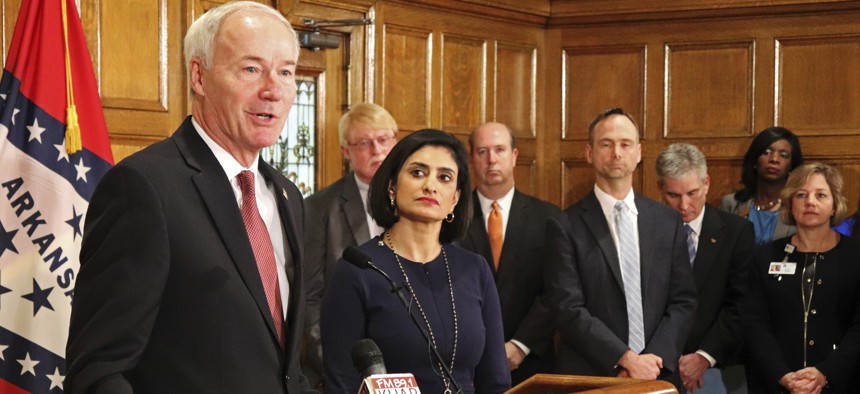Federal Appeals Court Blocks Medicaid Work Requirements

Gov. Asa Hutchinson speaks at a March 2018 news conference about Medicaid work requirements at the state Capitol in Little Rock, Ark., with Seema Verma, the head of the Centers for Medicare and Medicaid Services. AP Photo
An Arkansas program that required most Medicaid recipients to work, volunteer or attend school to receive health coverage was "arbitrary and capricious," a three-judge panel ruled unanimously.
A federal appeals court on Friday upheld a lower court ruling that blocked work requirements for Medicaid recipients in Arkansas, saying the program—and the federal government’s approval of its terms—was “arbitrary and capricious.”
The three-judge panel from the U.S. Court of Appeals for the District of Columbia Circuit unanimously upheld a district court ruling from last March, which blocked Kentucky from implementing work requirements and halted the program in Arkansas.
Kentucky Gov. Andy Beshear, a newly elected Democrat, later rescinded his state’s requirements, so the new decision affects only Arkansas, though its implications could spill over to other states. Lawsuits are in progress over similar policies in New Hampshire, Michigan and Indiana.
Under federal policy, states can deviate from Medicaid’s minimum coverage requirements to participate in “experimental, pilot or demonstration projects” that are “likely to assist in promoting the objectives” of Medicaid. But they need to receive approval from the U.S. Department of Health and Human Services.
Arkansas received a waiver for its “Arkansas Works” program, which placed a number of requirements on Medicaid recipients, most notably a policy that required beneficiaries between the ages of 19 and 49 to “work or engage in specified educational, job training or job search activities for at least 80 hours per month.” (Certain people, including pregnant women, students or full-time parents, were exempt from those requirements.) Nonexempt recipients who failed to meet the requirements for any three months during a plan year would lose their Medicaid benefits and be prohibited from re-enrolling until the following year.
The Trump administration's approval of the policy was unlawful, the court found, because it did not address how the program would promote Medicaid’s legally defined objective of providing health care to poor populations. Roughly 18,000 people in Arkansas lost their health-care coverage as a result of the policy, the opinion noted, which runs counter to the federal program’s directive.
“In short, we agree with the district court that the alternative objectives of better health outcomes and beneficiary independence are not consistent with Medicaid,” Judge David Sentelle wrote in the ruling. “The text of the statute includes one primary purpose, which is providing health care coverage without any restriction geared to healthy outcomes, financial independence or transition to commercial coverage.”
Attorneys for the plaintiffs said the ruling affirmed that the work requirements were an attempt by the administration to gut Medicaid coverage across the country.
“The court confirmed that this administration’s effort to ‘explode’ Medicaid by converting it from a health-care access program to a work program is arbitrary and illegal,” Sam Brooke, deputy legal director for the Southern Poverty Law Center, said in a statement. “We hope the federal government and the states will return to focusing on expanding health coverage and access, so that everyone—regardless of economic status—can be healthy.”
The ruling was the first from an appeals court on the Trump administration’s push to enact stricter work requirements for Medicaid recipients. Twenty states are in the process of implementing work requirements after the administration in 2017 invited proposals to do so, though some have voluntarily halted their progress while courts consider the legality of the programs.
It’s unclear whether the administration will appeal to the Supreme Court. The Centers for Medicare and Medicaid Services said in a statement that the agency was “reviewing and evaluating the opinion and determining next steps” while remaining “steadfast in our commitment to considering proposals that would allow states to leverage innovative ideas.”
Arkansas Gov. Asa Hutchinson was disappointed by the ruling, saying in a statement that the policy’s goal of improving the lives of health-care recipients was consistent with federal guidelines.
“Arkansas implemented a work requirement in order to help recipients get worker training and job opportunities while receiving benefits," he said. “It is difficult to understand how this purpose is inconsistent with federal law. The court’s ruling undermines broad public support for expanded health-care coverage for those struggling financially.”
Kate Elizabeth Queram is a Staff Correspondent for Route Fifty and is based in Washington, D.C.
NEXT STORY: 5 common mistakes of digital optimization





